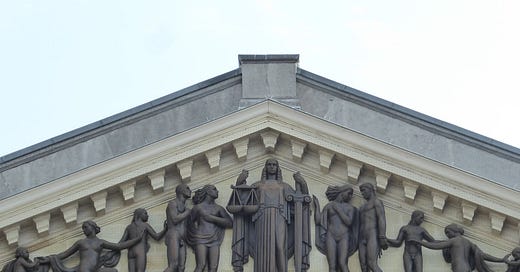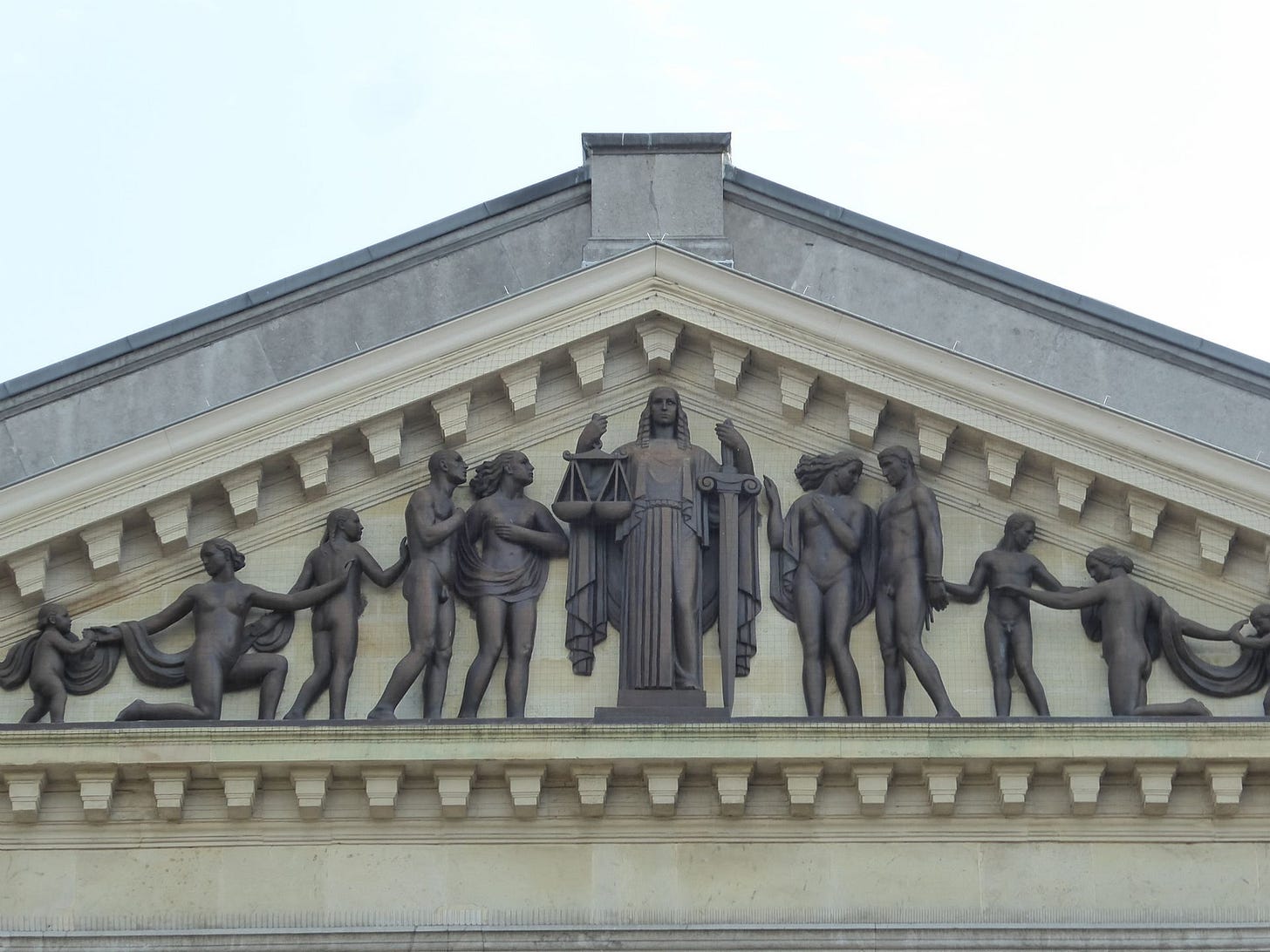Themis/Iustitia, Old Courthouse, Ghent, County of Flanders
As Judge Paul Matey has recently reminded us, both at The New Digest and in the Harvard Journal of Law and Public Policy, the author of the legal bible of the founding era — William Blackstone — famously wrote that the modalities of legal interpretation include “the reason and spirit of the law.” As explored below, this view was firmly a part of the legal consensus not only of the founding era, but well after, and indeed through the nineteenth century.
In recent decades, however, textualist and originalist judges and lawyers, while often professing adherence to Blackstone in particular and to the legal understandings of the founding era generally, have nonetheless made ferocious efforts to expunge the spirit of the law from legal interpretation. A quotation beloved by textualists since the early 1990s is a passage from Justice Anthony Kennedy’s concurrence in Public Citizen v. Department of Justice, in which Kennedy quipped that “[t]he problem with spirits is that they tend to reflect less the views of the world whence they come than the views of those who seek their advice.” (I for one recall that quip sardonically every May and June in recent years, when the Court’s putatively textualist and originalist Justices, all professing devotion to the-ordinary-meaning-of-text-in-context-as-of-the-time-of-enactment, end up splitting 5-4 or 6-3 on what the ordinary meaning in fact means— with both camps insisting that their preferred reading is clearly correct. Perhaps this, too, says more about the views of the Justices than about the texts they consult. And one might wonder also whether textualists and originalists should retire a quotation about judicial subjectivity that sits very ill in the mouth of the author of Obergefell.).
Most recently, however, the Spirit seems to be on the move again — if not in history, then certainly in legal theory. I’ve rounded up a few data points of the legal zeitgeist here:
Brian Flanagan, a leader in the burgeoning new field (or subfield) of “experimental jurisprudence” wrote for The New Digest last week on “Hard Evidence of the Spirit of the Law.” Summarizing recent experimental findings, Professor Flanagan observes that “ordinary people have tended to report that there is a sense in which [an unjust law] is not truly a law at all” (Thomas Aquinas of course nods sagely here); that conduct contrary to widespread political morality is also widely seen as “in some sense unlawful,” even if there is no positive law making it so; that “[w]e now know that a rule’s text is the dominant but not the sole determinant of how we think it ought to be applied” (which is a fine one-sentence restatement of Blackstone’s view, and of the classical view generally); that “from the layman’s perspective, the content of the law is not in fact ‘a matter of social fact whose connection with moral or any other values is contingent and precarious’” (here quoting but contradicting Joseph Raz); that “the more empathetic a person is, the more likely they are to prioritise law’s spirit over its letter”; and overall that the results of recent empirical findings on intuitive understandings of law “have tended to support classical suggestions about legal intuitions that the modern positivist turn had largely dismissed.”
One of our leading originalist law professors, Sai Prakash of the University of Virginia, has a new paper on “Spirit” — which, according to the originalist scholar Michael Rappaport, “strongly argues that at the time of the Framing of the Constitution, interpreters looked to the the spirit of a document, not merely to its letter.” I had the pleasure of hearing this paper presented at Harvard Law, where Prakash is visiting this semester, and I can confirm that Rappaport’s assessment is correct: the argument is strong, indeed overwhelming. Prakash is no doctrinaire; he follows the evidence where it leads, and in this case it leads him to find that Blackstone’s view was the legal mainstream in the founding era and at least through the 1830s, where the paper’s intellectual legal history stops. Importantly, the idea that the legal methods of the founding era can somehow be detached from the original public meaning of the provisions that the framers and ratifying conventions enacted is a non-starter. As Prakash emphasizes, and as classical lawyers have long insisted, the founding-era view was that the “spirit of the law” is itself one way that meaning is determined - part of what legal “meaning” means, not an override of legal meaning or something external to it.
As I recently recounted at The New Digest, the Supreme Court is currently considering a case, Trump v. Anderson, in which the leading relevant precedent (albeit not binding), Griffin’s Case, appealed to “the general spirit of the Constitution,” “first principles of justice and right,” and the “consequences” of possible interpretations. Griffin’s Case raises the, er, specter that originalist-textualist Justices will rule in favor of the President who appointed them by invoking a decision whose methodology contradicts the Federalist Society tropes on the basis of which those Justices were appointed. At oral argument in Trump v. Anderson, Griffin’s Case featured as a central topic of discussion. Counsel for former President Trump and some of the Justices, such as Brett Kavanaugh, worked hard to confine the significance of Griffin’s Case, describing it as (merely) contemporary originalist evidence of the public meaning of Section 3 of the Fourteenth Amendment — an approach that tries to detach the bare result of the decision from the non-originalist legal conceptions and methods underlying that result. (A similar approach has fared poorly in the context of the “history and tradition” test for substantive due process and other rights). Other Justices, however, appealed more directly to modern translations, or perhaps embodiments is the word, of “the general spirit of the Constitution.” Justices from Alito to Roberts to Kagan to Jackson worried openly about the destabilizing systemic consequences of a ruling that each state could decide on presidential qualifications for itself, subject only to possible Supreme Court review — precisely the same concern that Griffin’s Case discussed in more spiritual terms.
More generally, the spirit of the law now breathes through the work of other leading textualists and originalists, both on and off the bench. In addition to Prakash, Judge Neomi Rao appeals to “axioms of reason” and “moral values drawn from the natural law” as “traditional source of legal meaning”; Will Baude and Stephen Sachs have, just in the past couple of years, begun to talk openly about “unwritten law” and “equitably construing statutes”; and so on. Textualism-originalism has come a very long way since 2022.
As for other legal systems, my colleague Conor Casey’s recent essays on the Irish Constitution and common good constitutionalism show that legal interpretation in Ireland regularly involves lawyers reading posited text in light of the underlying principles of the Constitution. He writes that “Irish Courts see posited constitutional text as an important part, but not exhaustive of, the polity’s overall legal commitments, which also include background principles of legal justice. In hard cases, Irish Courts approach interpretation by attempting to understand the meaning of posited constitutional text considering the principles of political morality and legal justice underpinning them. This approach is visible across a range of influential cases concerning the duties placed on political authorities to safeguard and vindicate the flourishing of citizens from unjust attack, and in cases providing robust protection to the institution of the Family from state overreach. It is also visible in the fact that Irish public law doctrine works from the premise that the Constitution envisages the common good and true social order as the proper ends of political authority.” Conor’s work is a useful reminder of how parochial some American legal theory has become in its quest to expel reflection on the underlying reason or spirit of posited law in order to inform its meaning.
It is of course hard to know whether these are genuinely signs of the times, or just fortuitous data points with no larger significance. “The Spirit [or wind, or breath - pneuma] blows where it wills, and you can hear the sound it makes, but you do not know where it comes from or where it goes” (John 3:8). Yet if legal history is any guide at all, there is a kind of cycling in legal theory, an eternal recurrence of the debate between strict positivism, on the one hand, and views that incorporate reason or spirit as well as pure fiat into the interpretation of legal meaning, on the other. Sooner or later, the wheel will turn again, and it may well already be in motion, impelled by the spirit of the age.





I don't know if off-topic comments are permitted, but I wanted to thank Professor Vermeule for the fascinating recent dialogue with Peter Thiel, now on YouTube:
https://youtu.be/euzxpbBOju8?si=5BH-fvRTlxcStoM-&t=2007